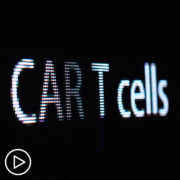How Are Cultural and Language Barriers to CAR T Therapy Being Addressed?
How Are Cultural and Language Barriers to CAR T Therapy Being Addressed? from Patient Empowerment Network on Vimeo.
How are CAR T therapy barriers of cultural and language nature being addressed? Expert Dr. Sikander Ailawadhi from Mayo Clinic discusses research study results on access barriers and ways to create solutions that address language and cultural issues.
[ACT]IVATION TIP
“…having a culturally sensitive discussion and a system that approaches the patients for complex treatments like CAR T or clinical trials. And personally, I’ve seen that it makes a big difference to the patient’s consideration of those treatment options.”
See More from [ACT]IVATED CAR T
Related Resources:

How Can CAR T-Cell Therapy Be Explained to Patients and Families? |

Reducing CAR T-Cell Therapy Barriers for Relapsed/Refractory Myeloma |

Roadblocks for Black and Latinx Patients From CAR T Trial Access |
Transcript:
Lisa Hatfield:
Dr. Ailawadhi, we know cultural or language barriers may hinder access to information about CAR T-cell therapy. How are you and your colleagues addressing this barrier?
Dr. Sikander Ailawadhi:
It’s very important to think about cultural or language barriers and how they may affect our way we deliver the care and the way the patients consume that healthcare. A few years ago we had done a study looking at just electronic medical record usage and how patients participate in their EMRs, for example. And we realized that for patients who are non-white, language barrier was a big issue because frankly, majority of our EMRs are English. They don’t provide a lot of Spanish or other language support.
Similarly, clinical trials and education material for CAR T, et cetera, they are very frequently in English. There is an increasing number of Spanish documents that are becoming available. So how we try to overcome these barriers, I think we have started, utilizing an approach in our institution where our research staff, we are trying to hire a diverse population.
There is data that based on studies, it has been very clearly shown before that, a patient is more likely to consider favorably a clinical trial or a treatment if it is being offered by someone who look and speak like them. So an African American patient is more likely to accept or consider a treatment, I would say, not even accept, but consider a treatment if it is being offered by an African American physician, an African American clinical research coordinator, et cetera.
While I’m not African American, I can’t change that, but we have African American, Hispanic, Asian clinical research coordinators in our teams, and we have noticed a clear difference in the patient’s understanding their ability to ask questions, their willingness to ask questions and clear out their barriers if it is given to them in a culturally sensitive, culturally appropriate manner. So my activation tip for this question would be, having a culturally sensitive discussion and a system that approaches the patients for complex treatments like CAR T or clinical trials. And personally, I’ve seen that it makes a big difference to the patient’s consideration of those treatment options.










